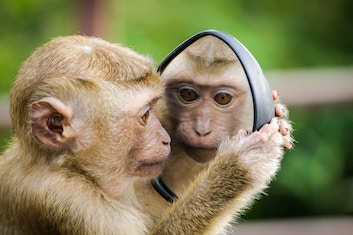
To start with, let’s remember what reflexive pronouns are. They are what I dubbed the ‘selfie’ pronouns: myself, ourselves, yourself, yourselves, himself, herself, itself, themselves and – a bit controversially – themself (for more on this particular pronoun, see the post on gender-neutral pronouns).
We use them when we want to refer back to the main protagonist – in technical terms, the subject – of a sentence rather than any other person or thing.
- She splashed mud on the car.
- She splashed mud on herself.
There is nothing controversial or remotely incorrect about this type of use.
- The monkey saw itself in the mirror.
- You did all this by yourself?
- They have no one to blame but themselves.
- All by myself, I relaxed and enjoyed the view.

We also use reflexive pronouns to emphasise a particular person or thing in a sentence. This is often done for a light-hearted, joking effect.
- He, himself, finished the project.
- Me, myself and I – that’s who did all the work!
Incorrect use of reflexive pronouns: they don’t make you more polite
In speech, and less often in writing, people are sometimes confused by reflexive pronouns and attempt to use them to achieve a politer, more formal effect.
- I’m having a celebratory lunch for my birthday and I’d like yourself and Simon to come.
- You’ve achieved a good result here but spending some more time on researching the topic first would have been the approach recommended by myself.
These two examples are wrong. Reflexive pronouns are not a more polite way to say you or I; they are a way of emphasising or referring back to a noun or personal pronoun already mentioned in the sentence.
- I’m having a celebratory lunch for my birthday and I’d like you and Simon to come.
- You’ve achieved a good result here but spending some more time on researching the topic first would have been the approach recommended by me.
The trouble with Microsoft Word’s grammar checker and reflexive pronouns

MS Word’s grammar checker often highlights reflexive pronouns, as in the image above. The problem is that there is often nothing wrong with the reflexive pronouns that it it highlights.
- The adventure begins around 3 p.m. when the overnighting guests wave goodbye to the day-trippers and have the reef to themselves until the next lot of tourists arrive the following day.
What does MS Word think is wrong with that sentence? Heaven only knows! My suspicion is that the grammar checker is confused by long sentences, and cannot tell whether or not the reflexive pronoun has an antecedent (a noun or pronoun that it is referring back to you). In this sample sentence, themselves refers back to the overnighting guests and there is no problem with the reflexive pronoun.
But what is even more problematic is that MS Word may not recognise a reflexive pronoun incorrectly used with the misguided idea that it more polite.
Don’t let Microsoft Word confuse you! Just because the grammar checker highlights a reflexive pronoun doesn’t mean you have to change it. On the other hand, if you think you may have used a reflexive pronoun incorrectly in an effort to make your document sound less blunt and more polite, MS Word may not help you find any wrongly used reflexive pronouns. How can you be sure you have used them correctly? Just make sure there is antecedent in the sentence!

If you have found this post interesting, you can find a full index to my other posts on the index page. To be notified when I post a new topic, follow me on Facebook! If you have any particular questions you’d like me to answer in future posts, just send me a message. I’m always interested to learn what people think, and how you came across this site, so please post a comment.
If you think you would be interested in either my complete grammar course or an individual customised online course (particularly suited for people who don’t live in Melbourne), just click your preferred option.
Photos: selfie by Amy Humphries and monkey by Andre Mouton, both on Unsplash